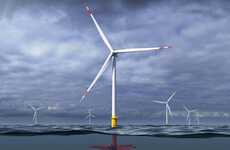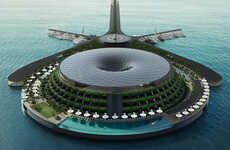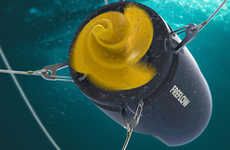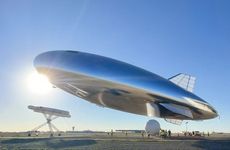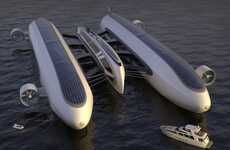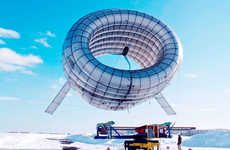
The Air Hydroelectric Station Will Generate Power From Clouds
Rahul Kalvapalle — August 28, 2014 — Eco
The Air Hydroelectric Station or Air HES is a blimp, currently still in prototype stage, that is designed to harvest and condense water vapor to yield both clean water as well as electricity. The condensed water vapor is used to spin an electric turbine generator to produce power.
The Air Hydroelectric Station will use water vapor condensation, hydroelectric generation and airship technology and will be released to an altitude of 2,100 meters where it will float among mid-level clouds in the troposphere. Once there, it will use a curtain of vapor-condensing mesh to collect and condense water.
Water collected from this process will then be fed down a lightweight pipe attached to the balloon, and will be able to provide enough energy to rotate a turbine on an electric generator and generate electricity.
The Air Hydroelectric Station will use water vapor condensation, hydroelectric generation and airship technology and will be released to an altitude of 2,100 meters where it will float among mid-level clouds in the troposphere. Once there, it will use a curtain of vapor-condensing mesh to collect and condense water.
Water collected from this process will then be fed down a lightweight pipe attached to the balloon, and will be able to provide enough energy to rotate a turbine on an electric generator and generate electricity.
Trend Themes
1. Electricity-generating Blimps - The development of air HES creates a new market for eco-friendly energy generation, as it avails an opportunity to curtail overreliance on fossil fuels and present active innovation opportunities in renewable energy.
2. Water-vapor Condensation Technology - The air HES can help streamline research efforts to explore how to collect water from vapor as an alternative to ground water sources and to improve water management systems.
3. Tethered Airships - The air HES raises interest in exploring other potential roles for airships beyond present tools for research and transportation in the aviation industry.
Industry Implications
1. Green Energy - The development of the air HES presents significant disruptive innovation opportunities for the alternative energy industry, and renewable energy sectors.
2. Water Management - The air HES technology may introduce a disruptive innovation into the water management industry, bolstering plans for eco-friendly water management processes.
3. Aviation - The air HES represents a significant concept in the future of airflight since it challenges traditional views about the role of airships in air transportation.
6.2
Score
Popularity
Activity
Freshness



